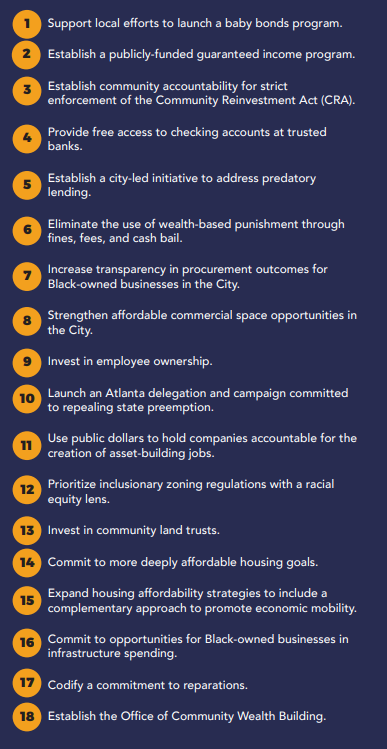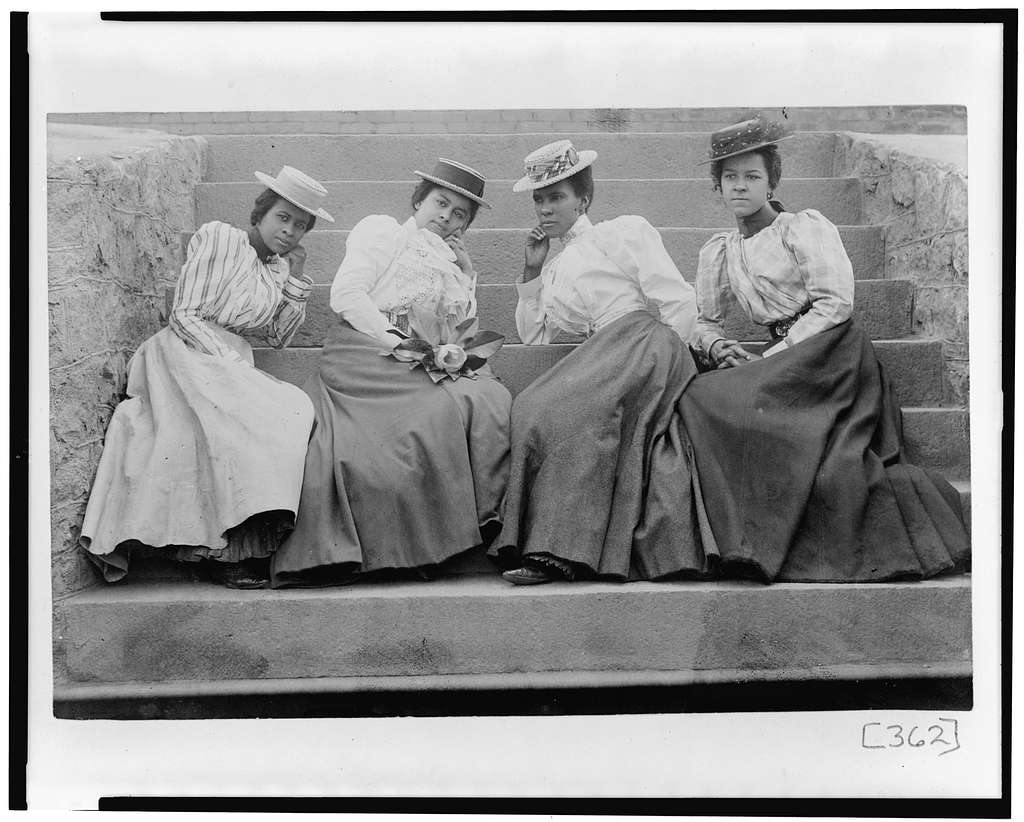According to the most recent U.S. Census Bureau data, Atlanta has the highest income inequality in the nation, which contributes to a massive disparity in total wealth between the city’s white and Black residents.
The Atlanta Wealth Building Initiative has found that white Atlanta families have a median household income of $83,722–three times higher than Black families’ median income of $28,105. When looking at total wealth, the gap widens enormously. White Atlanta households have a staggering 46 times more wealth than Black households–$238,355 for white families, compared to just $5,180 for Black ones.
The Atlanta Wealth Building Initiative has released a new report, Building A Beloved Economy: A Baseline and Framework for Building Black Wealth in Atlanta, that digs into the factors behind this huge racial wealth disparity and offers 18 ways that city leaders can catalyze wealth-building for Black Atlantans.
Beyond income inequality, the nonprofit has found, the racial wealth gap is driven by things like home ownership, generational wealth transfers, debt, access to banking and capital, and business ownership. Notably, income is not the primary driver of wealth for white households–but it is for Black ones.
Atlanta Civic Circle spoke with Alex Camardelle, the Atlanta Wealth Building Initative’s vice president of research and policy, to find out more.
According to Camardelle, the nonprofit’s research into how Black Atlantans can most effectively build wealth began in 2017 and focused on stimulating entrepreneurship. This strategy produced mixed results.
“We were still experiencing significant disparities in terms of who is getting access to capital. It raises the question of ‘Is entrepreneurship truly a wealth-building tool?’” he said.
The Atlanta Wealth Building Initiative concluded that expanding Black entrepreneurship is only part of the solution. The researchers decided to dive further into why these racial wealth disparities exist. Because there are so many factors, Camardelle said, simply increasing access to capital or credit isn’t the only answer. Atlanta’s racial wealth gap needs a portfolio of solutions that address the multiple structural obstacles that prevent black Atlantans from building wealth.
According to the report, other obstacles include underinvestment in Black communities by government and financial institutions, legacy economic racism, and financial markets that prey on poor people of color.
“The point of including topics like [these] is to underscore that piecemeal programmatic solutions that focus just on individual efforts are completely insufficient. We cannot train our way out of these issues,” said Camardelle, through financial literacy programs, job training and the like. In other words, it’s unrealistic to tackle systemic racial discrimination by telling Black people to use some financial tips to pull themselves up by their bootstraps.
“There needs to be large scale, public investment and structural policy changes to reverse the centuries worth of harm that has led to the racial wealth divide,” Camardelle said.
Intergenerational wealth divide
For starters, the wealth gap is more stark than the average person would likely assume. Fully 36% of Black households in Atlanta–or over one third–have zero net worth at all. That means their total household debt is greater than the value of their assets. By comparison, only 13% of Atlanta’s white households have zero net worth. (For Latino households, 20% have zero net worth, as do only 11% of Asian-American ones.)
Since the median net income for Black households is only one-third of that for white households, other ways to build wealth, like home ownership, must be taken into account.
One crucial point that the wealth-building report makes is that Atlanta’s racial wealth gap is intergenerational.
Half of total wealth in the United States comes from intra-generational transfers–in other words, inheritances. Home ownership is a common way for Americans to pass down wealth to the next generation–but Black Atlanta households make up 48% of the city’s population and own only 17% of the housing wealth.
According to an American Community Survey from the U.S. Census Bureau, one in five Black Americans are experiencing poverty for the third generation in a row, compared to just one in 100 white Americans.
Persistent disparities between Black and white Atlantans as far as intergenerational wealth, poverty and income are just the tip of the iceberg in the report’s diagnosis of the challenges for Atlanta in building Black wealth.
Access to capital and easy banking
Access to capital is an extremely important issue for Black Atlantans, Carmardelle said. Nearly half of Black households are either unbanked or underbanked, he added. Two of the report’s solutions for Atlanta leaders are around banking: Provide free access to checking accounts at trusted banks and establish a city-led initiative to combat predatory lending.
Expanding reliable community banking in Black neighborhoods is another part of the solution, Camardelle said. With so many online banking services, people may assume that physical banking locations are a thing of the past, but he said that is a misconception.
“What makes a brick-and-mortar bank important is just access to talking to a human being. You need to have a relationship with your banking partner if you expect that person to manage your money,” he said. “Oftentimes, there are issues that you can’t remedy just by logging into an app.” What’s more, people who don’t have broadband access can’t rely on online banking in the first place.
Having actual local banks in Black communities offers a variety of advantages to community members, he added. Members can go in for financial literacy classes, information on investments and help with loans.
Two solutions in play
Of the Atlanta Wealth Building Initiative’s 18 recommendations and solutions for building Black wealth in Atlanta, the first two–a local baby bonds program and a guaranteed income program– are already in pilot stages through the Georgia Resilience and Opportunity (GRO) Fund. The non-profit formed last fall to advance economic security for Atlantans.

The baby bonds program, which the GRO Fund plans to launch later this year, aims to give $50,000 to Atlantans of color between ages 15 and 24 for wealth-building investments. The idea is to mimic the funds, whether a down payment on a house or college funding, that wealthy families often give to young members when they reach adulthood.
The guaranteed income program, which the GRO fund calls the “In Her Hands” initiative, has already launched. A 24-month pilot program is providing Atlanta mothers of color $850 per month to help with childcare, additional expenses, debt paydown and other needs.
Next up, we’ll dive deeper into baby bonds with the GRO Fund’s Director of Programs, Amit Khanduri. We discuss how the accelerated pilot program works, its current status, the desired outcomes for participants and much more!



I believe that many of the factors related to building wealth in the black population relates to families and education. The negative effect of government programs that “give” things, i.e. money, phones, reduced rent, food subsidies, etc. removes the sense of pride in accomplishment that is more prevalent in white families. One example is generational wealth. Focus on better education and personal responsibility. Many of the recommendations mimic the federal policies that have led to many of the issues reported in this article and many of the “public” solutions are racist in their nature and would violate civil rights legislation.
Found the white guy